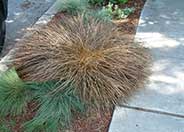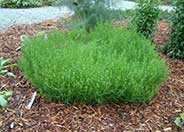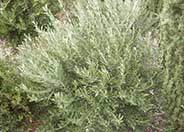
Common name:Blue Fescue
Botanical name:Festuca glauca
This ground cover/grass will grow less than 1' tall and has small, blue green leaves.

Common name:Curly Top Sedge
Botanical name:Carex buchananii
This orange bronze ornamental grass/reed is 2'-3' tall and 1'-2' wide and does best in full sun to part shade.

Common name:Beach Strawberry, Sand Strawberry
Botanical name:Fragaria chiloensis
This perennial grows 4"-8" high with tooth-edged leaves and ornamental strawberries during the fall. Cut back or mow in early spring to encourage new growth.

Common name:New Zealand Flax
Botanical name:Phormium tenax
New Zealand Flax is a large, bold plant with stiffly vertical, sword-like, green leaves that arise from its base. It should be grown under full sun for best color. Varieties will offer different growth habits and leaf color.

Common name:Green Lavender Cotton
Botanical name:Santolina rosmarinifolia
Santolina is an amazingly tough plant with small, yellow, button-sized flowers that cover the 3' tall and 3' wide shrub in the summer months. The green leaves are very thin and needle like. This plant requires absolutely no care in most environments once established. Too much water will lead to mortality. Best grown in well drained soils.

Common name:Little Ollie Dwarf Olive
Botanical name:Olea europaea 'Little Ollie'
This evergreen shrub will grow to 8' tall and doesn't produce any fruit. It will do well in hot dry areas but can also survive in coastal areas.

Common name:Olive
Botanical name:Olea europaea
This broad tree will grow to 40' tall and has small, gray green leaves with fleshy black fruit that appears in fall. Purchase fruitless varieties to avoid the mess.
The Right Plant Right Place
Putting the right plants in the right places in the right groupings is both the challenge and art of good landscape design.
Click in the green box for more information
| Designer: | Attractive Groundcover |
Photographer: GardenSoft |
Soils and Compost:
Physical weed control, including mulching, or hand removal protects the watershed from harmful chemicals.
Water Saving Tip:
Mulching and adding compost to soil can minimize evaporation and help soil absorb and store water.
Integrated Pest Management:
Develop healthy soil for plants that are vigorous and naturally pest-resistant.

